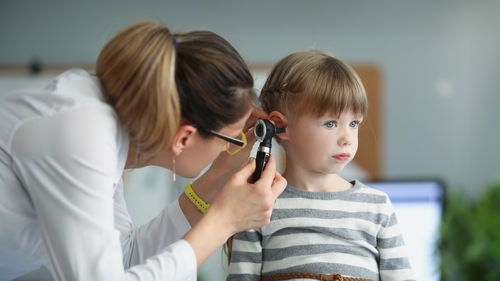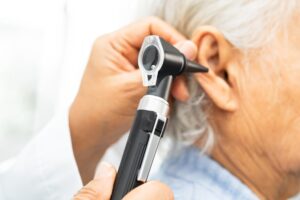Hearing is one of the most important senses for a child’s development. It supports not only language and learning, but also social skills and emotional growth. Hearing loss that goes undetected can impact speech clarity, school performance, and even self-esteem.
Pediatric hearing loss refers to a partial or complete inability to hear in children. It may be present at birth, develop in infancy or early childhood, or occur later because of illness or injury. With early awareness, diagnosis, and treatment, most children can thrive—communicating confidently and staying on track with their peers.
How Common Is Pediatric Hearing Loss?
Hearing loss in children is more common than many parents might realize:

- About 2 to 3 in every 1,000 babies are born with some degree of hearing loss.
- By age 12, nearly 20% of children will experience hearing loss in one or both ears.
- Some children pass newborn hearing screenings but develop hearing difficulties later, highlighting the importance of ongoing monitoring as children grow.
Types of Hearing Loss in Children
Hearing loss can be classified into three main categories:
- Conductive Hearing Loss – Occurs when sound cannot pass effectively through the outer or middle ear. Often caused by ear infections, fluid buildup, earwax, or blockages. This type of hearing loss, which is typically temporary, tends to be treatable with antibiotics, wax removal, ear tubes, or minor surgery.
- Sensorineural Hearing Loss – Results from damage to the inner ear (cochlea) or auditory nerve. It may be genetic, present at birth, or acquired from illness, trauma, or loud noise exposure. This type is usually permanent but can be managed with interventions like hearing aids or cochlear implants, and supported by speech and language therapy.
- Mixed Hearing Loss – A combination of conductive and sensorineural hearing loss.
Early Signs of Pediatric Hearing Loss
Parents are often the first to notice when something seems “off.” Warning signs vary by age:
- Infants – Not startled by loud sounds, not turning toward familiar voices, or not babbling by 6 months
- Toddlers/young children – Delayed speech, unclear articulation, frequent use of “huh?” or “what?”, or lack of response when called
- School-age children – Academic struggles, inattentiveness, or behavioral issues that may actually stem from difficulty hearing
If any of these signs appear, scheduling an evaluation with a pediatric audiologist is an important next step.
The Role of Newborn Hearing Screenings
Newborn hearing screenings are now standard in hospitals. Doctors typically perform these screenings before a baby leaves the hospital or within the first month of life. These quick, painless tests check whether a baby’s ears are responding to sound.
- If a baby doesn’t pass, it does not always mean permanent hearing loss, but follow-up testing is essential.
- Babies who do not pass should be tested again by 3 months of age, and if hearing loss is confirmed, intervention should begin as soon as possible.
How Hearing Loss is Diagnosed in Children
A thorough diagnosis often requires more than one type of test. Common assessments include:
- Otoacoustic Emissions (OAE): Measures inner ear response to sound
- Auditory Brainstem Response (ABR): Uses electrodes to track how the hearing nerve responds to sound
- Tympanometry: Evaluates middle ear function and detects fluid or blockages
- Behavioral Audiometry: Assesses how children respond to sounds in a controlled environment
Because children’s hearing needs change as they grow, specialists may recommend multiple tests over time. A pediatric audiologist will guide families through this process and discuss the best next steps.
Early Intervention Matters in Pediatric Hearing Loss
The earlier that hearing loss is detected, the better the outcomes for a child’s speech, language, academic, and social development. With the right diagnosis and timely support, children with hearing loss can flourish in school and in life.
If you have concerns about your child’s hearing—or if your baby did not pass a newborn hearing screening—don’t wait. Schedule a comprehensive evaluation today with Colorado Ear Care at Arvada, Castle Rock, Greeley, Lakewood, and Louisville. Early testing and treatment can make all the difference in giving your child the best opportunity to hear, learn, and thrive.




